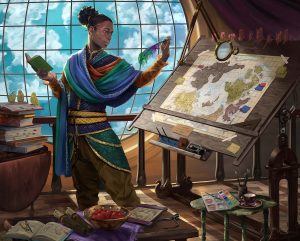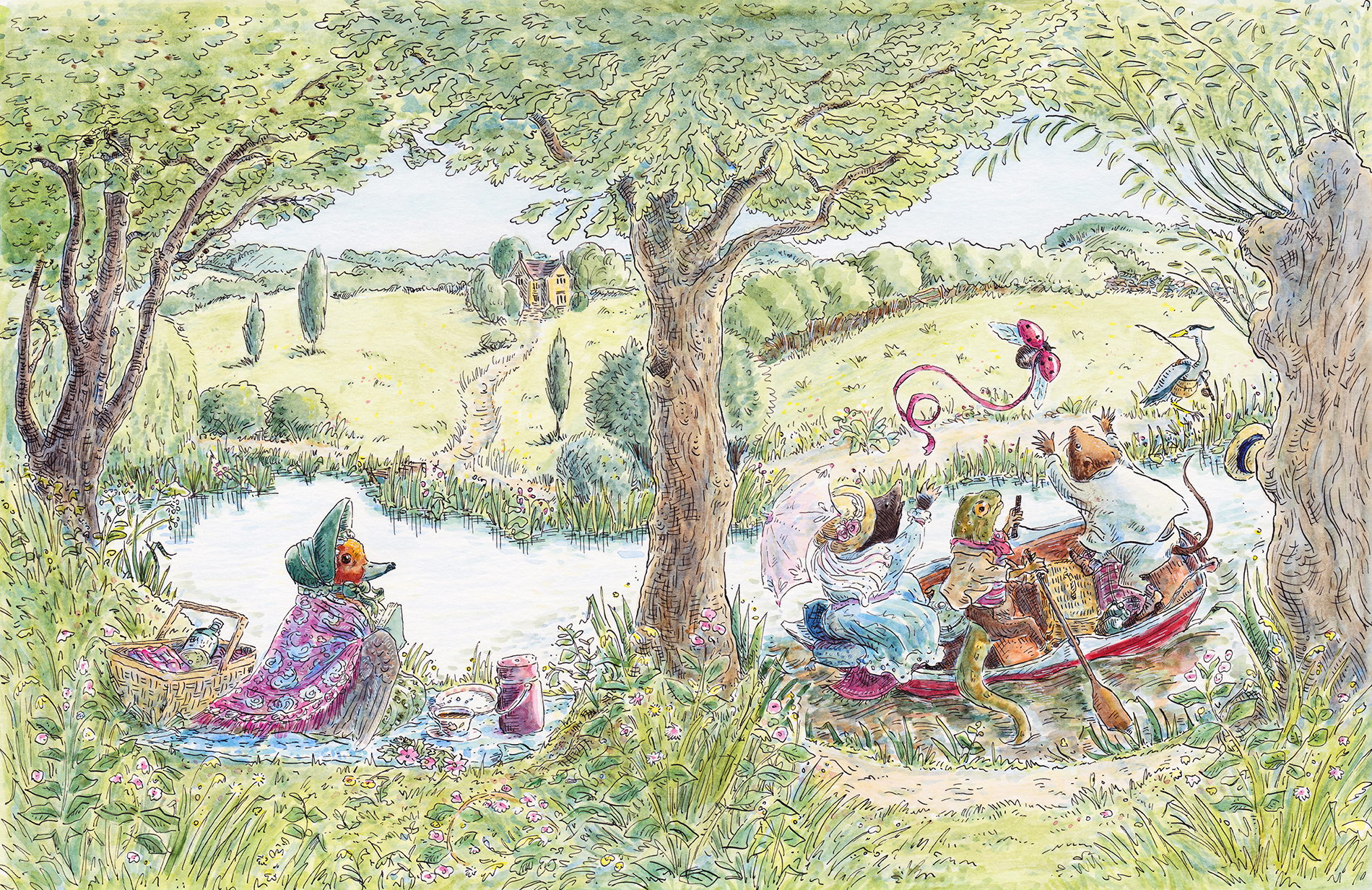
Game Changer is our monthly advice column for new GMs and older GMs who aren’t afraid to learn something. Our resident GMing expert, Brian Suskind, draws from his vat of experience to let you know how it goes.
You might recognize Brian’s name from any of a slew of past Kobold Press products such as Campaign Builder: Castles & Crowns (a homebrew kit to build out the kingdoms in your own world) and the Tales of the Valiant Monster Vault.
This months question comes to us from an unidentified asker:
Anonymous New GM asks . . .
All the GMing advice says to take notes. Is there a format or a style to organize this? What works for people?
Make a Note of It
Notes. Those little scraps of paper you find in your game room or house with obscure game references on them that you don’t understand, but they might be important, so you keep them.
You know what I’m talking about.
Some might say “curse is hidden in the potato” or the very helpful, “remember to introduce the ogre”. Now, if you could only remember who the ogre was and why it needed to be introduced.
Is there a better way to take notes or organize the notes you have?
Yes, and I’m going to tell you about it. Some people write notebooks full of background information, plotlines, maps, and encounter setups. That’s a bit railroad-y for me. I run a very improvisational game in a published setting (Eberron), so my game prep needs are smaller.
In any case, there are really three types of game notes: prep notes, in-game notes, and afternotes. The three types of notes are designed to keep you current on the game, give you ready access to what happened, as well as what you want to happen in the next game.
Prep Notes
These are notes you jot down before a game, describing the people, places, items, situations, and motivations that you foresee PCs running into. You could spend hours on this, and some people have fun doing that. If that’s fun for you, those hours are well spent.
But for what you’re realistically going to use in a session, 10–20 minutes should be enough. Worldbuilding is fun, but prep notes are about the next game session, not the whole campaign.
You can organize prep notes in a list format; use bullets if you’re neat. Here are the sorts of things that go into prep notes:
- Jot down each of your PC’s names and write one thing that you want to do to give that character a spotlight during the next game session. This could be a conversation with an NPC you’ve planned, a combat moment that plays to that character’s strength or theme, or a puzzle or story element that might appeal to a specific PC’s player. You might not get to all of them, but it’s helpful to have the list as a goal.
- If you know an encounter (combat or otherwise) is likely to happen, get down monster stats (or the location of where to find them) as well as environment/terrain aspects to include in the encounter. I like to add a “development” or “twist” line to these encounter notes—something that could happen during the encounter to make things more dangerous or interesting. More thugs rush in. The floor gives way. The building blows up.
- If any NPCs have carried over from the last session or are likely to appear in this session, put their names here along with some character traits. I prefer one sentence covering an NPC’s physical description and purpose in the game, and one sentence giving them a hook or quirk. Here’s an example:
Teffel Jorgenson. Human warrior from Trollheim; young, short, cropped hair, gray eyes. His parents wanted him to be a musician, but he’s tone-deaf and loves axes.
If you’re running a more structured game, add a short list of locations the PCs might reach this session, to help you remember to mention them if PCs get there. However, the more improvised your game is, the less written prep you need to do. (And, check out Improv Proficiency for tips and tools on upping your improv game.)
In-Game Notes
This will probably be the sketchiest part of your notes, because you’re doing a lot of things during a game and remembering to write stuff down is not necessarily at the top of your to-dos. Give yourself permission to be bad at in-game notes. Anything you manage to write down here is a win.
That said, train yourself to write down names in the moment. You’ll forget NPC and place names the quickest once the session is over. Players love encountering NPCs again and going to places they’ve visited before, so ensuring that you know how to bring them back is a big deal. Recurring elements are familiar touchpoints in a game world that can feel alien or underexplained, even to experienced players.
Also, try to capture anything that might bleed over into the next session or pay off at an unknown time in the future. A favor promised, a bargain struck, a threat issued. No one might remember these things (including you) if you don’t note it. But it’s a fun moment when something the players forgot about pops back up later.
For extra credit, listening to your players and writing down what they think during a session helps make a game more about them, and more fulfilling in the payoffs. It also shows you areas where you haven’t revealed enough (or perhaps revealed too much) and need to alter your descriptions going forward.
Afternotes
Speaking of going forward, afternotes are notes you write down after the game session is over and the players have gone home. This part of the notes might be the most structured, and falls into three main boxes.
1. Record any new NPCs or plotlines that popped up during play so you don’t forget names or identifying details. Especially if you missed a name during the in-game notes, this is probably your last chance to catch those before your brain dismisses them.
2. Most importantly, record the next thing the group plans to do. This can be simple. “Heading to the forgotten temple, 25 miles away,” or “Back to town to resupply,” or “Audience with the Duke.” Whatever it is, give yourself a prompt to remind future-you of how to start the next session. This helps you maintain momentum between sessions and start with a bang.
3. Finally, leave some space to write down thoughts about hits and misses, i.e., what worked and what didn’t. You don’t need to analyze this in the moment. This part of afternotes is for longer-term thinking. Once you do this a few times, you can look at patterns in your GMing style and notice larger strengths and weaknesses. Maybe one player shuts down after 10 pm. Maybe everyone responds well to a certain kind of character you portray. You might not notice this until it comes up a few times.
What about Notes on the Whole Campaign?
Campaign notes are worthwhile, but I don’t consider them game notes. They’re more like campaign records.
By this, I’m talking primarily about PC notes, lists of NPCs and locations, and overarching campaign ideas. The records work hand-in-hand with the three types of game notes.
After each session I update the page or two of shorthand notes I keep for each PC, add or subtract any NPCs encountered, and alter/update any large campaign plans I might have. These are different than game notes because they don’t usually change too much, while game notes are constantly changing.
Where Do I Keep Notes?
For the three types of game notes, I prefer spiral-bound notebooks. I can scratch a quick note in a notebook much faster than I can pull up a document and type something.
I keep campaign records on a Google Doc or Word document. That way, I can find things quickly with a simple search function.
In the end, there isn’t one best way to take game notes, one perfect place to keep them, or one best way to organize them. Try a few things and keep doing what sticks. Do what you need to keep track of the important people, places, things, and ideas of your games. Keeping notes helps your players feel like you have things planned out, and it helps you craft sessions and campaigns to take advantage of that feeling.
What Do You Think?
What system or tools do you use to keep your ideas organized and accessible? Let us know in the comments or over on our Discord server!
Do you have a question for Game Changer? Tell us about it. Then check back first Friday of each month for more Game Changer!
Have you heard about our new crowdfunding campaign for RiverBank, the cozy game of chaos?
Sign up today to get notified!

